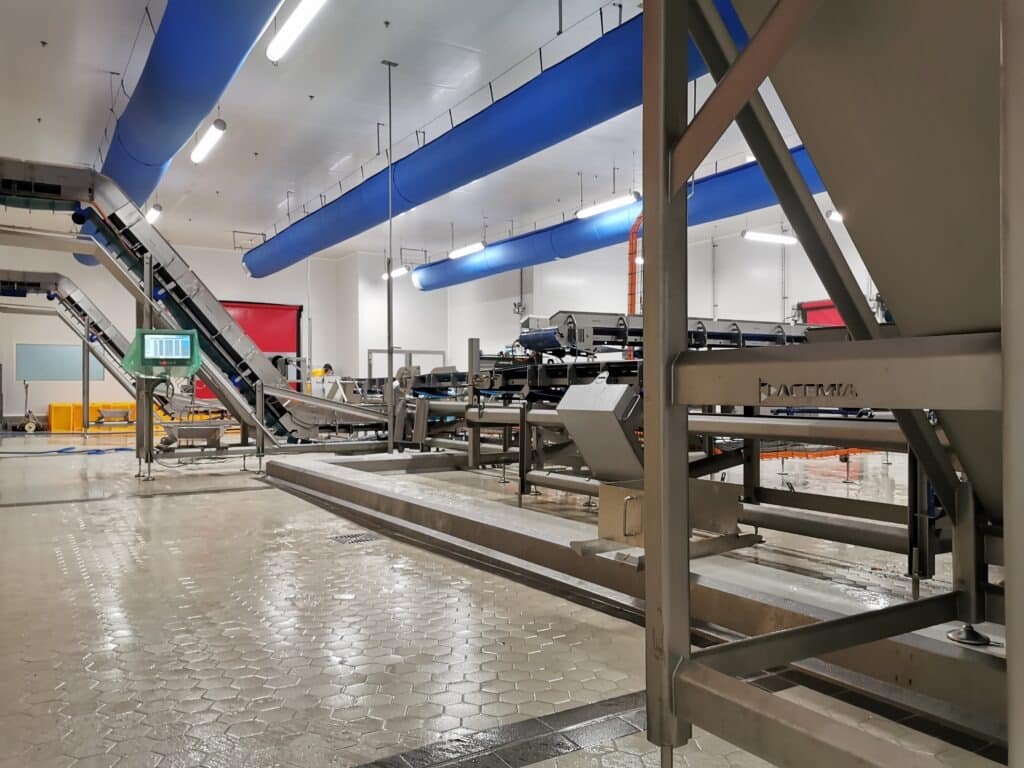Food safety and hygiene have become essential priorities for the food industry. As sanitization standards become more stringent, conveying solutions must evolve to ensure both product quality and safety throughout the production journey. In response to these challenges, Acemia is developing solutions tailored to meet future demands.

The food industry is continuously evolving to meet growing demands for food safety and hygiene. Consequently, conveying solutions need to be reinvented to ensure product safety while adhering to the strictest standards. Here are the key emerging trends in this field:
The development of materials used in hygienic conveying solutions is undergoing significant advancement with the integration of more effective antimicrobial properties. Future systems will incorporate innovative materials capable of preventing the proliferation of not just bacteria but also other microorganisms (viruses, fungi, etc.). These materials will provide long-lasting protection against contamination and ensure optimal conveying conditions.
Current research in antimicrobial materials points to several promising avenues for hygienic conveying. Among the emerging technologies are polymers incorporating silver nanoparticles and photocatalytic coatings. However, these solutions must prove their long-term effectiveness and compliance with strict food industry regulations, particularly regarding potential migration of substances into food and their environmental impact.
Smart traceability solutions, based on IoT (Internet of Things) technologies, already play a key role in the food industry, but upcoming developments promise significant advancement of these systems. Advanced sensors will enable the collection of more precise data on conveying conditions, such as temperature, humidity, and other environmental factors. These technologies will become increasingly integrated and automated, allowing for proactive risk management and providing more reliable and detailed real-time tracking solutions. As a result, process transparency will improve, ensuring optimal food safety and allowing for better anticipation of market needs.
With the diversification of food industry needs, conveying solutions must offer greater flexibility. Modular designs, already widely used in the food industry to optimize space and meet varying product requirements, are set for further enhancement. Future modular solutions will integrate advanced technologies, such as automation and artificial intelligence, to improve the management of conveying spaces and adapt in real-time to specific product needs. This evolution will maximize both operational efficiency and enhance sanitary safety in addressing future challenges faced by the food industry.
Sustainability has become a critical aspect of future conveying solutions. Stakeholders across the supply chain – from consumers and food companies to regulatory bodies – are increasingly demanding environmentally friendly and responsible practices. This is driving the use of recyclable materials and efforts to reduce the carbon footprint of production equipment. Additionally, logistics solutions must evolve to minimize waste and maximize energy efficiency, while maintaining impeccable food safety standards.
Acemia, a leading specialist in the design and implementation of intelligent and hygienic conveying and logistics solutions, is proactively addressing these future developments. The company actively develops innovative solutions that meet both current industry expectations and anticipated future challenges:
Acemia implements antimicrobial materials specifically designed to reduce microorganism proliferation. Our solutions feature 100% stainless steel construction, which provides an ideal material for hygienic environments due to its non-porous nature, corrosion resistance, and ease of cleaning. This approach aims to create self-disinfecting surfaces that simplify maintenance, reduce cross-contamination risks, and increase equipment durability. Furthermore, the integration of antimicrobial PU belts enhances equipment hygiene.
All components, including motors, reducers, and sensors, carry IP69K certification, ensuring dust and high-pressure water resistance and providing optimal protection in even the most demanding environments. Our choice of materials and design also eliminates retention areas and guarantees impeccable hygiene.
The equipment features a bead-blasted finish with a Ra of 0.8, creating smooth, easy-to-clean surfaces that minimize contamination risks. Frame welds are executed using watertight, continuous, pickled, and passivated techniques, and all piping undergoes gas welding. This comprehensive manufacturing process prevents bacterial proliferation on the equipment.
Acemia incorporates eco-responsible solutions through features such as Cleaning in Place (CIP), enabling efficient cleaning of production systems without disassembly. This innovative solution, combined with our hygienic design, achieves up to 50% reduction in water and disinfectant consumption. The implementation of CIP principles and easily disassembled machines has enabled our clients to significantly reduce cleaning times while achieving superior cleaning quality.
Our cleaning ramp design maximizes efficiency through strategically placed nozzles that optimize mechanical impact during cleaning. Acemia also provides precise reporting of cleaning product consumption for each machine. We further support sustainability through the integration of low-energy components, contributing to reduced electrical consumption and improved energy efficiency.
As part of our eco-responsibility initiatives, Acemia includes detailed recycling instructions for machine components in our manuals. This approach reflects our commitment to reducing our ecological footprint while advancing sustainable development. We have also pioneered the use of PU belts and detectable plastic parts in our lines, ensuring that contaminated products are immediately detected by X-rays and ejected, maintaining optimal food safety.
For delicate products, Acemia develops specialized hygienic conveying solutions that ensure protection and integrity. The RAID (Robot Additional Ingredient Depositor) system exemplifies our flexible approach. Its versatile design allows engineers to create different solutions that mount on the base system, adapting to various product types and containers. The system’s mobile chassis and wheels enable fast installation, and it can be configured for ingredient deposition into trays, cardboard packaging, or thermoformers, while maintaining optimal hygiene, product quality, and high-speed operation.
In partnership with Oxypital, an AI vision systems expert, Acemia implements intelligent visual inspection solutions for production line optimization. These AI-based systems perform real-time anomaly detection, identifying manufacturing defects and non-compliant products while collecting valuable data. Oxypital ensures seamless integration of these tools into existing equipment without disrupting ongoing processes. This technology drives improved yields, enhanced product quality, and reduced waste through proper reorientation or revaluation of defective products.
The future of hygienic conveying solutions presents both exciting opportunities and significant challenges. Success will depend on the integration of advanced materials, smart technologies, and sustainable practices as new industry standards emerge.
Through our forward-thinking approach to innovation, we remain committed to helping our partners navigate this transition. By developing reliable, flexible, and environmentally friendly solutions, we actively contribute to addressing tomorrow’s needs in hygienic conveying solutions. Our commitment to the future encompasses optimal food safety and responsible resource management to create a positive and sustainable impact.
